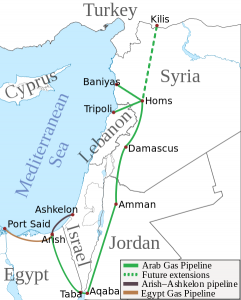Former oil minister Sameh Fahmy was sentenced to 15 years in jail on 28/06 by an Egyptian Court for selling gas to Israel below international market rates and squandering public funds. Other energy officials and a business man, Hussein Salem, also received heavy fines and jail terms. Gas sale to Israel, part of a hugely unpopular deal among Egyptians, was interrupted in April 2012, following 14 sabotage attacks on the pipeline that transports the gas to Israel and Jordan.
Although a sign of increasingly strained relations between Egypt and Israel since the ousting of former President Hosni Mubarak’s regime, the interruption of gas sale to Israel is also the result of growing domestic demand, casting doubt on Egypt’s export ambitions and previous deals to supply gas to other neighboring countries.
According to the 2011 BP Statistical Energy Survey, Egypt had, in 2010, a total production of 61.33 billion cubic meters of which 45.11 billion cubic meters are reserved for domestic consumption which is growing at a faster rate each year. Since 2008, Egypt has been providing Israel with gas through the Arish-Ashkelon submarine pipeline, a branch of the Arab Gas Pipeline. The interruption is indeed a blow to Israel on the short term, given that Egyptian gas represented around 40% of its domestic needs. But the newly-discovered Tamar field in Israel’s maritime waters will begin serving the domestic market as of 2013 and will be able to meet Israeli demand for decades, while production at the even larger Leviathan field, reserved for exports, is expected in 2017.

Repeated disruption of natural gas supplies through the Arab Gas Pipeline has claimed another “collateral damage”: Jordan, which normally relies on Egyptian gas to satisfy as much as 80% of its needs. It now has to contend with much less and must find an alternative to secure local consumption. On 16/06, the Jordanian minister of energy Alaa Batayneh declared that Jordan is planning on building a liquefied gas terminal at the Red Sea Port of Aqaba by 2014 and call for tenders for the multi-million dollar project is expected later this year. Jordan will also have to find an LNG supplier. Qatar is well-set to be the main provider. Egypt’s original plans of expanding the Arab Gas Pipeline to Europe via Turkey now look out of reach.
Putting an end to the 20-year deal with Israel and regularly interrupting supplies to other regional neighbors as a result of repeated sabotage attacks might end up hurting Egypt’s interests in more than one way. Indeed, Egypt is now perceived by energy markets as an unreliable supplier, incapable of protecting its own infrastructure. On the longer run, when local production will be unable to meet the rapidly growing demand necessary to sustain the county’s economic development, Egypt will have to look for alternative sources. Cairo might have been selling gas to Israel and Jordan (and to other countries such as Spain) at a cheap rate. But it could have managed the situation in a much more delicate way. Renegotiating the deal and reviewing the price would have been a wiser decision. Egypt, which will need to import gas in the future unless new fields are discovered, would have been in a stronger position to negotiate favorable rates from a geographically close country expected to become a major gas exporter in the next few years.
